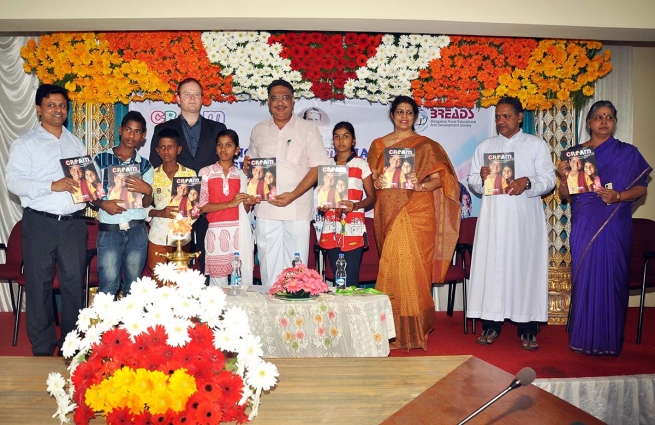INDIA: Close to 100,000 Children Received Child Rights Education through CREAM Project

(MissionNewswire) Close to 100,000 children have been educated about their rights through 907 special clubs and courses offered in schools across India. This education is thanks to Salesian missionaries’ child rights education programs offered through the CREAM project (Child Rights Education and Action Movement – Action Movement and Education on Rights of Children), which is sponsored by the Office of Development of the Province of Bangalore (BREADS – Bangalore Rural Education And Development Society).
During the course of its four year history, the project has seen other success including 1,571 dropouts that have been brought back to school, 1,144 youth that have been taken from dangerous child labor working conditions, and 1,473 street children helped through social reintegration programs. The project has also prevented 172 early marriages.
The project was initiated in December 2012 in order to reach the most disadvantaged children in 10 districts in the Indian state of Karnataka, especially in high risk urban rural areas. The goal was to work with youth to build a culture of protection of children’s rights. The project also puts a strong emphasis on improving the potential of minors as well as ensuring the sustainability of activities and results. The project is about to launch into its second phase working to reach 150,000 youth through child rights education.
“Youth in every region and in every culture around the globe are entitled to basic human rights,” says Father Mark Hyde, executive director of Salesian Missions, the U.S. development arm of the Salesians of Don Bosco. “Through educational programming, the Salesians fight tirelessly each day to make sure the voices of marginalized youth are heard and accounted for. This program will help to enhance this work and make sure every child knows his or her human rights and is able to become a part of the development process.”
Youth in India, especially those living in poverty, are faced with child abuse, neglect, exploitation and forced child labor at an alarming rate, according to UNICEF. India has the largest number of child laborers under the age of 14 in the world and many are forced into dangerous occupations and live on the streets. In 2010, India passed a landmark law mandating that all children between the ages of 6 and 14 be in school, but according to UNICEF, millions of children remain in the workforce. Full implementation of the law was to go into effect in 2013, but child workers can still be found in almost every industry in India. The problem is enforcing the law, particularly in high poverty regions of the country.
With more than 400 million poor people, or one-third of the world’s poor, according to UNICEF, ensuring youth have access to education in order for them to find stable employment at the appropriate age and break the cycle of poverty, is a priority in the country. Although more than 53 million people escaped poverty between 2005 and 2010, most remain vulnerable to falling back below the poverty line.
The goal of Salesian human rights clubs is to ensure that youth are aware of their basic human rights as well as the resources available for prevention and ongoing support. Human rights clubs tackle issues relating to child marriage, sexual assault and exploitation, child labor, school dropout rates and the rights to nutrition, clean water and sanitation and adequate infrastructure for home and school.
###
Sources:
ANS – India – Launch of second phase of the CREAM project to continue serving the least
Salesian Missions – India
UNICEF – India




